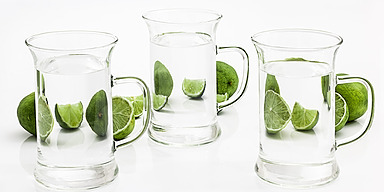By quantity, water is the most important nutrient to consume. Water comprises more than 70% of the human body and is involved in all systems and physiological processes. However, with the excessive demands and distractions of everyday life, it’s easy to forget about drinking enough water throughout the day. Effects of dehydration can quietly be a factor or primary origin of many undesired symptoms the general population can experience.
If hydrating properly is not a consistent habit, drinking enough water can be a simple solution to improve how you feel and function. Hydration needs are individual-specific and vary depending on a number of factors. Get to know yourself and be aware of what conditions your body is experiencing. Being aware of urination frequency and urine color can be a useful indicator of hydration levels.
Hydration levels have been shown to impact:
- Physical performance
- Cognitive performance
- Sleep and Mood
- Kidney function
- Digestive function
- Heart function
- Joint health
- Hormone production and balance
- Immune system
- Skin health and sweat production
- Headaches
- Chronic disease
- And more…
General Reference
Start by figuring out how much water you need to consume per day. You can use this handy hydration calculator to calculate your hydration needs.
Remember To Increase Water Consumption With:
- Increases in physical activity and energy expenditure
- Elevated temperatures
- Sweating
- During pregnancy
- During periods of illness
Take Action
Staying properly hydrated is easy, but like anything requires conscious practice before it becomes a good habit. If hydration is a health parameter you’d like to address…
- Form a habit of Hydrating: Carry a water bottle with you – having water with you at all times: in your car, at your workstation, and in your gym bag. Refilling throughout the day and sipping consistently is ideal. Replace compulsive habits such as snacking and drink water instead!
- Rise and Hydrate: Instead of coffee being the first beverage you reach for in the morning, start your day off with a tall glass of water to replenish fluids lost during sleep. Your body will thank you for it.
- Infuse your water: Treat your taste buds and improve compliance of your efforts to drink more water. Simply add lemon, cucumber, berries or sliced fruit to your water. It is best to avoid sugary artificial flavoring alternatives.
- Blend good nutrition with good hydration Incorporate foods into your everyday diet that are nutrient-rich and also help with hydration. Consume smoothies and plenty of water-rich foods such as fruits, vegetables, healthy soups, and yogurt.
- Monitor substances and supplements Alcoholic and caffeinated beverages as well as, certain supplements or medications act as diuretics, which cause your body to eliminate water. Those who consume alcohol and/or caffeine regularly or in excess are at increased risk of a number of health issues including those related to dehydration. Be aware of the effects substances have on your body! Cut back or eliminate excessive consumption that is negatively impacting your health and replenish lost fluids by drinking plenty of water.
- Limit Intake of high sodium foods and toxins Any unwanted solute that is filtered and eliminated through the kidneys as urine. Without sufficient water in your body to help with this process, urine will be highly concentrated, imposing excessive stress on your kidneys and other body systems. To improve elimination and kidney function: Eat less high sodium, highly processed foods and Drink more water!
- Be consistent and proactive Forgetting to drink water all day and then guzzling water before bed is not recommended. This can increase wakefulness, negatively impacting sleep quality and levels of fatigue. Waiting until you feel thirsty to drink water is bad practice, especially if your body is active, sweating and requiring more water! Once you feel thirsty your body can already be experiencing decreased performance. Drinking extra water ahead of activity and sipping water throughout the day is best practice for hydration.
- Respond to increases in physical activity with increases in hydration During and after periods of physical exertion, individuals may not hydrate adequately when drinking according to thirst alone. Be proactive and drink plenty of water before, during and following physical activity. _”The American College of Sports Medicine guidelines for fluid intake recommend that people drink about 17 ounces of fluid about two hours before exercise. During exercise, they recommend that people start drinking fluids early, and drink them at regular intervals to replace fluids lost by sweating.”
- Low sugar sports drink alternative Electrolytes lost during sweating are restored with a proper diet, however, a sports drink can be a helpful immediate source, especially with extended periods of physical exertion (i.e. during sporting events). Conventional sports drinks contain unhealthy artificial ingredients and excessive amounts of processed sugar or sweeteners. As a healthier alternative - Make your own sports drink using a combination of the ingredients below.
Ingredients:
- 1 litre of liquid(green tea, herbal tea, coconut water, plain water, etc)
- ⅛ - ¼ tsp high quality salt
- 1 tsp calcium magnesium powder
- Optional: ¼ cup or more of juice (apple, grape, lemon, orange, etc)
- optional: 1-2 tbsp sweetener (honey, maple syrup, stevia, etc)













